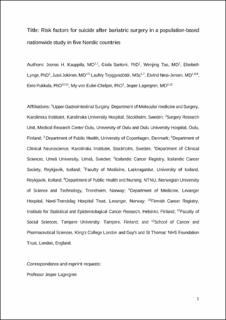| dc.description.abstract | Objective:
To identify risk factors for suicide after bariatric surgery.
Summary background data:
Bariatric surgery reduces obesity-related mortality. However, it is for unclear reasons is associated with an increased risk of suicide.
Methods:
This population-based cohort study included patients having undergone bariatric surgery in 1982 to 2012 in any of the 5 Nordic countries, with follow-up through 2012. Eleven potential risk factors of suicide (sex, age, comorbidity, surgery type, surgical approach, calendar year of surgery, history of depression or anxiety, psychosis, schizophrenia, mania, or bipolar disorder, personality disorder, substance use, and number of previously documented psychiatric diagnoses) were analyzed using Cox regression.
Results:
Of 49,977 bariatric surgery patients, 98 (0.2%) committed suicide during follow-up. Women had a decreased risk of suicide compared to men (hazard ratio [HR] = 0.48, 95% confidence interval [CI] 0.33–0.77), although age and comorbidity did not influence this risk. Compared to gastric bypass, other types of bariatric surgery had lower risk of suicide (HR = 0.44, 95%CI 0.27–0.99). There was no difference in suicide risk between laparoscopic and open surgical approach. A history of depression or anxiety (HR = 6.87, 95%CI 3.97–11.90); mania, bipolar disorder, psychosis, or schizophrenia (HR = 2.70, 95%CI 1.14–6.37); and substance use (HR = 2.28, 95%CI 1.08–4.80), increased the risk of suicide. More of the above psychiatric diagnoses increased the risk of suicide (HR = 22.59, 95%CI 12.96–39.38 for ≥2 compared to 0 diagnoses).
Conclusions:
Although the risk of suicide is low, psychiatric disorders, male sex, and gastric bypass procedure seem to increase the risk of suicide after bariatric surgery, indicating a role for tailored preoperative psychiatric evaluation and postoperative surveillance. | en_US |

